QuestionGreetings,
Sushi is my three month old little girl. Tonight she developed dry heaving, coughing spasms that sprung out of nowhere. We have two ferrets (Chumak who is 7 months old) and I've heard them cough before usually after having some water, but for some reason Sushi wouldn't/couldn't stop and it looked like she was trying to vomit but nothing came out. She had slightly laboured breathing that would come and go as well. It also seemed that things would get worse if she tried to drink water. We got on the phone right away and were making preparations to take her to the hospital and the coughing and heaving subsided and at one point it was almost gone. We went anyway, however half way there it all stopped and she seemed just fine. So we turned around leaving it to some food that was caught in her throat and it cleared with the bumpy ride (maybe), but she seemed fine and that's what's important to us.
Through out all of this, her physical appearance was fine. She still wanted to play, inspect, wrestle and climb all over us. She still has an appetite and ate and drank after we got her home and she's still as itchy as always. But the heaving and coughing sprung up once again for a short period (5 minutes) and went away once more.
Of course if it continues in the morning I'll be taking her to the vet or, should there be any other changes that may have sprung up after this.
As far as her regular everyday life, she gets plenty of exercise we feed her Marshals food, she gets the laxatone, treats, fresh food everyday, fresh water at least three times a day, they sleep in their cage and roam around our ferret proofed rooms (living room and bedroom but they sometimes make a quick dash to the bathroom but I always catch them within seconds after they've gotten there. And they are never allowed in the kitchen.) The only recent changes we've made is a large tupperware container filled with rice for them to dig in which someone from this website recommended (regarding a bored Chumak) and an octopus tunnel play toy made especially for ferrets.
I've thought about what could be causing this distress in Sushi and I can only think of a few.
1. pretty much everything I've read says that she may have a hairball. (however, there is no change in appetite and her stool is still normal, although it maybe too soon to tell.)
2. The carpet at the front entrance is littered with small rocks and salt from outside (they salt and gravel the roads in the winters here and sometimes gets dragged into the house but that's been going on for a while and I have never seen them eating anything off the carpet and are usually only there to scratch at it or to climb into our shoes.)
3. I was cooking with some crushed chili (the really hot kind) and she may have licked my finger. (But I washed my hands really really well and I'm not even sure if she did lick my hands at all.)
4. Maybe it's just some food stuck in her throat.
Neither one of them scrambled and snuck into the bathroom today so I'm pretty sure I can knock that off the list as something they may have gotten into while there.
Well, I've tried to explain in as much detail as I can so that nothing is obscured. Tonight I sleep with the door open and if there is anything that resembles a problem I'll be taking her straight away to the hospital. If she's fine in the morning I'll just pay close attention for any changes and stay vigilant through out the day (taking the day off work). I would appreciate an answer whether I take her or not for future reference. I expect everything will be fine because I'd do just about anything for my little ferrets.
Thanks in advance for your response.
Jamie
AnswerHi Jamie:
Wow, thanks so much for a very thorough description of all potential contributing factors to your little one's problem. It helps greatly to be able to have the whole picture. You are definitely a rare and wonderful ferret owner to carefully observe and report so thoroughly!
I agree with your assessment that her coughing is *most likely* hairball related. Most ferrets groom themselves enough that even by three months of age they actually can be working on a hairball. If you add to that the possibility of ingesting either toys, or chewing on pieces of hammock or bedding while awaiting adoption (VERY common for energetic, bored kits), it is not at all uncommon for very young ferrets to already be working on intestinal blockages by the time you bring them into your home!
I see that you do give your kids Laxatone; thanks for that information also. I used to give my kids hairball remedy very regularly and *thought* that and thorough ferretproofing and supervised play would virtually make an intestinal blockage unheard of for my kids! Wrong! One of my ferrets had a hairball a few years ago, despite having hairball remedy given regularly! After costing me about $1,000 for that surgery, I began searching for a more effective way to attack the problem of hairballs, since I had *never* really seen my kids pass anything when I had given them hairball remedy. Yes, it was goopy and I told myself it was the thing to do to give it to them, but I never *saw* any results.
In my search for a SAFE and EFFECTIVE solution to hairball problems, I found a product called Vetasyl - used mostly for cats with hairball problems and/or dogs with constipation. It is a fiber-based laxative with psyllium and barley that is taken with a lot of fluid and it expands inside the stomach/intestinal tract, then moves through the digestive system, taking everything in its way along with it to be excreted safely and painlessly. Then I began experimenting with dosages; carefully making sure to give enough water, so as not to cause a blockage (could happen if you gave Vetasyl with not enough water).
Finally, with the help of my vet, who is very ferret savvy, I have developed what works great and has been absolutely miraculous not only for my kids, but for many many other folks here on the AllExperts group and within the ferret community. You can get Vetasyl at almost any online veterinary supply or pet store, and most local pet stores too.
Instead of goopy, messy petroleum-based hairball remedies, I take the contents of ONE VETASYL CAPSULE (toss the capsule itself away), TWO LEVEL TEASPOONS OF UNCLE JIM'S DUK SOUP MIX (by Marshall's Ferret Foods), and SIX OUNCES OF VERY WARM WATER. STIR WELL WITH YOUR FINGER (to be sure it's not too hot for your ferret to drink).
If you have multiple ferrets, it is best to TREAT ONLY ONE FERRET AT A TIME, so you know for sure how much of the mixture that ferret ingested and exactly what came out and at what stage in the treatment. It's a good idea to keep a written record on each ferret for future reference, as ferrets tend to follow a pattern, some ferrets just seem to be more prone to blockages than others and will consistently pass hairballs, some on the second day, some on the third or even the fourth day of treatment...once you figure out each ferret's "normal", note it for future reference. EACH FERRET MUST be monitored to be SURE he/she drinks MOST of the six ounces - the more the better. My large male slurps all six ounces without hardly taking a breath - he loves it. If your ferret will drink something else better - use it as the 'base' to put the Vetasyl in, just MAKE SURE that whatever you use is ONLY THE CONSISTENCY OF WATER and it DOES NOT CONTAIN SUGAR (this much of anything with sugar in it could throw a ferret into a real sugar crisis). If you use your own homemade "soup", be SURE to thin it down until it is the consistency of WATER when you give this treatment. If the ferret isn't wild about the mixture, DON'T GIVE UP! Continue to TRY to offer it...add a little Ferretone, re-warm it, add a little butter, peanut butter melted and stirred in, whatever it takes to get the ferret to take it as long as the mixture remains watery and NOT sugary - and try to be sure it's something that's healthy for your ferret because six ounces of ANYTHING is like eating a *huge* meal for a ferret..this is why I use Uncle Jim's - it is meant to be a meal & if made 'thin' enough, it is the right consistency and is still good for the ferret too. The more of the mixture the ferret eats, the better the Vetasyl will work and the more likely effective it will be in cleaning out your ferret's intestinal tract.
Next you will be watching for what the ferret passes. This can start anytime from about 3 to 4 hours after eating the mixture. The poops will be very recognizable because they will be fatter than usual and can contain things you may recognize, and some things you may not even recognize. I always recommend that you pick these poops up out of the litterbox with a paper towel, spread them with a popsicle stick or something similar. It's a good idea to at least TRY to make sure you can account for ALL pieces of a toy or other item you find in your ferret's poops - a small piece MAY mean there is more inside. Any time something is passed other than stool, give the ferret at least one more treatment, which hopefully will move any remaining pieces through the intestines. Again, continuing to check poops for anything recognizable. Things like pieces of balloons, ear plugs and similar items are especially important to keep all passed pieces and make sure you can account for the whole item, not just part of it.
The first time I gave the THREE-DAY VETASYL TREATMENT to my big male ferret, on the third day (which is how we decided to make it a minimum of a three-day treatment) he passed a hairball the size and shape of my little finger that was covered with green pus on one end (sorry so graphic)!! Little did I know, he was already working on another $1,000 intestinal blockage surgery just two months after his previous one (and he had been on Laxatone DAILY since his surgery too!)! I KNEW I HAD TO DO SOMETHING DIFFERENT and IMMEDIATELY! Again, any time a ferret does pass 'goodies' other than just poop, be sure to give the treatment for at least one more day to ensure everything is out. There are folds in the intestine where things can *hide*, but not from the Vetasyl for long! One more day treatment even removed the pus and some smelly fluid my ferret had been hiding deep in the folds of his intestines and within the next two days he was once again ornery and back to his energetic silly self again! And I had no idea he was even working on a blockage! Scares me when I realize how close he really was to a life-threatening problem. I never would have suspected another intestinal blockage so soon after the first - I absolutely credit Vetasyl with saving me a whole bunch of vet bills at the very least, and at most for saving my ferret's life!
Where to get what you need? Almost any good pet store, either online or brick and mortar, will carry one or both products. Here is one place you can get Vetasyl (I haven't been able to find Vetasyl in a ferret store yet, but have requested that Drs Foster & Smith start carrying it):
http://www.1800petmeds.com/pdetail.asp?SK=10508
Of course there are many many others who carry it, mostly dog/cat supply stores. Vetasyl costs about $15.00/bottle of 100 capsules.
You can find Uncle Jim's Duk Soup Mix here:
http://www.drsfostersmith.com/product/prod_display.cfm?pcatid=17529&Nty=1&Ntx=mo...
...and it costs about $10.00 a jar not including shipping. So a total of only a $25 investment lasts a long time to ensure your ferret's intestinal health!
I hope you will try the Vetasyl treatment. I would like to see it become the new standard in basic ferret care instead of petroleum-based ferret/cat hairball remedies. It is just so much more effective, even though it's just a tad more trouble to prepare. If you have any reservations, please discuss the safety of it with your ferret vet and follow his/her recommendations. Those who have used the Vetasyl on their ferrets have given some incredible feedback and reported some really surprising things that have been passed in the litterbox! There have been no negative reports so far; no reports of intestinal rupture. There should NOT be, as long as people follow the directions and make sure they only give the Vetasyl with six ounces of water. It's a good idea to STIR THE MIXTURE OCCASIONALLY AS THE FERRET DRINKS IT - at least that's what I do. The ferret gives me an annoyed look, but that's okay :-) The Vetasyl tends to fall to the bottom of the bowl if not stirred, so I do get better overall results if I slip my finger in and stir it 2 or 3 times while he slurps it.
**IMPORTANT WARNING: VETASYL *MAY* BE USED IF AN INTESTINAL BLOCKAGE IS SUSPECTED - BUT IT ABSOLUTELY *MUST* BE UNDER THE SUPERVISION OF A FERRET VET QUALIFIED TO TAKE YOUR VET TO SURGERY IMMEDIATELY IF IT BECOMES SUDDENLY NECESSARY - DO NOT TREAT KNOWN BLOCKAGES AT HOME. If your ferret's stomach becomes bloated and painful after ingesting Vetasyl mixture and he/she appears frantic and/or unable to poop, get to an emergency vet immediately for surgery. It is possible that intestines *could* rupture under the additional pressure of Vetasyl on an unhealthy intestine!**
The other thing you mentioned that concerned me was your little girl's apparently frequent itching. If you don't mind, even though I don't believe this is your ferret's problem, I will give a bit of information on how to resolve itchiness, as 'itchy' ferrets are pretty common and I haven't addressed this problem recently. I think a little information would probably help lots of folks.
When I first had ferrets, I thought itchiness and ferrets was 'normal', but actually a healthy ferret on a premium ferret diet should not be itchy. There are several things that can cause itchiness, dry skin due to poor quality food, insufficient rinsing after bathing, and fleas are the most common causes. Every ferret should be eating a PREMIUM FERRET FOOD such as Totally Ferret, Marshalls Premium, Path Valley Ferret, Mazuri, Sheppard & Greene, etc. Here is a great table that compares various ferret foods and their nutritive values:
http://www.mdferretpaws.org/care/food_treats.html
Any food changes must be made slowly with ferrets, but it is always worthwhile to get ferrets on a healthier food. Healthy premium hi-protein ferret-specific foods do help ferrets live longer, healthier lives.
Another way to get a little extra oils and HEALTHY fat in your ferret's diet is to get Ferretone and cut it half and half with virgin olive oil. Your ferret can have up to a tablespoon of this a week as long as it is half olive oil. Both the olive oil and the Ferretone will help your ferret's coat and skin be softer and shinier, but if you give Ferretone by itself, it is far too easy to overdose a ferret on Vitamins A and D, since they have no way to shed any extra they ingest. Unlike water-based vitamins, they are not eliminated in the urine or stool and can build up to toxic levels in the blood. Just for safety sake, if you mix the Ferretone with virgin olive oil, you won't have to worry so much about overdosing your ferret on these vitamins and can even give a couple drops (diluted with olive oil) each day if you wish. You can even dilute it more than half and half if you wish. The ferrets don't seem to notice a difference.
When bathing ferrets, I use Johnson & Johnson baby shampoo (or you can use a ferret-specific shampoo if you wish) and I also use J&J (gentle) creme rinse, which helps the shampoo rinse out of the fur more thoroughly and leaves the skin and fur soft. Always rinse at least twice, making sure all traces of soap are out of the ferret's fur.
If you suspect fleas, OR if other pets in your home may have fleas, you will need to treat not only ALL THE PETS AT THE SAME TIME, but the ENVIRONMENT ALSO (carpets, couches, etc). Fleas actually prefer the higher body temperature of ferrets and, if given the opportunity, will move from dogs and/or cats to a ferret for the extra warmth. If you can be sure the cats and dogs are free of fleas, you can rest a little easier when it comes to the ferrets. There are several kinds of flea treatments available specially for ferrets. Marshall's brand has a product called "Ferret Flea and Tick Shampoo" that is non-toxic and non-drying to the skin. It can be used safely once every two weeks without drying out ferret's skin or coat. This product also comes as a spray, but sprays are just not really a good idea for ferret's since they are so wiggly and you're as likely to get their eyes as any other place on their little bodies.
VERY IMPORTANT: You may also use KITTEN flea shampoos and treatments on your ferrets, but ONLY if the product's active flea-killing ingredient is PYRETHRIN. DO NOT use any product on a ferret containing "organophosphates", "carbamates" or "petroleum distillates". They may be harmful to ferrets.
CAUTION: DO NOT *EVER* USE ON FERRETS -
Flea treatments for dogs
Flea treatments for cats
Flea or Tick Dips (NO DIPS OF *ANY* KIND, Actually)
Flea Collars
Sprays of any kind (bad for their eyes)
Powder of any kind (can cause lung ailments)
Cleaning the environment - Wash all ferret bedding with HOT water and detergent. Vacuum the carpets throughly - you can even CUR UP A FLEA COLLAR AND PLACE IT INSIDE THE VACUUM BAG BEFORE YOU START VACUUMING, SO IT KILLS ANY FLEAS THAT ARE VACUUMED UP. For very serious infestations, you may flea "bomb" the home WHEN THE FERRETS ARE NOT IN THE HOME - BE SURE TO REMOVE THEM FROM THE HOME, and KEEP THEM AWAY FOR AT LEAST SIX TO EIGHT HOURS AFTER TREATMENT. Or, follow the specific directions on the bomb you choose for "small animals", or check with your vet to be safe. Personally, I just don't like using deadly chemicals around the ferrets and I would keep my kids out of the house until it could be flea-bombed, given time to kill the fleas, then completely scrubbed out to remove all traces of chemicals - Lord help me if we ever get fleas!
There are long-term treatments you can use on ferrets, although none of them have been scientifically tested on ferrets, so cannot be deemed "safe" (by medical standards). Some ferret owners use "one drop" kitten flea treatments, but BEWARE...SOME FERRETS HAVE HIGH SENSITIVITY to these products. THESE PRODUCTS CANNOT BE WASHED OFF ONCE APPLIED! As always, I strongly recommend that you talk to your vet BEFORE you decide to use ANY non-ferret products on your little ones. Your vet will be your best guide in how to treat fleas safely considering ALL pets in your home.
I'm sure this is much more information than you have asked for. Since I haven't talked about fleas for a long time, I thought I'd go ahead and cover that today. I somewhat doubt your little one has fleas, but just in case, you now have all the information. I do suspect she may be in the early stages of working on a hairball, which is the PERFECT time to start treatment with Vetasyl. Once your kids get used to the Uncle Jim's / Vetasyl treatment, they will even stand in line and wait their turn for their 'soup'. After the initial few rounds of treatments, and especially in older ferrets who don't get into much trouble, it's okay to treat more than one ferret at a time, but I still feed the mixture to each ferret one-at-a-time to make sure I know that each ferret did eat enough to get a good treatment; that and getting the treatment on a regular schedule are the absolute NEWEST TREATMENT IDEAS to ensure your ferret's good digestive health. Hope your little one has some really good results - please write and let me know if anything especially interesting comes out! ;-)
Sincerely,
Jacquie Rodgers

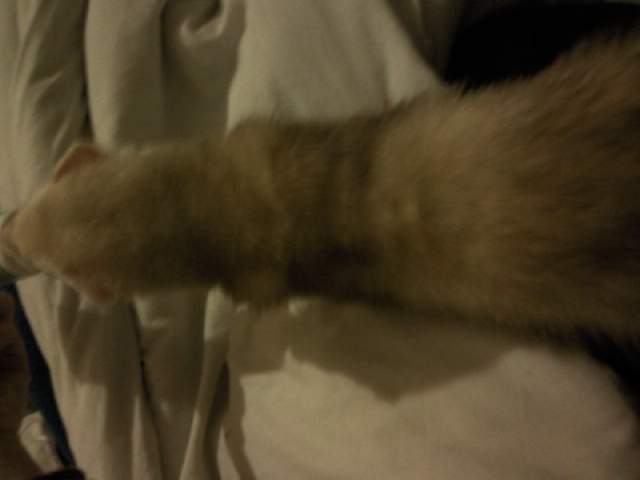 Fat boy with lumpy neck
QuestionOdins neck
QUESTION: Hi,
My 9 month old
Fat boy with lumpy neck
QuestionOdins neck
QUESTION: Hi,
My 9 month old
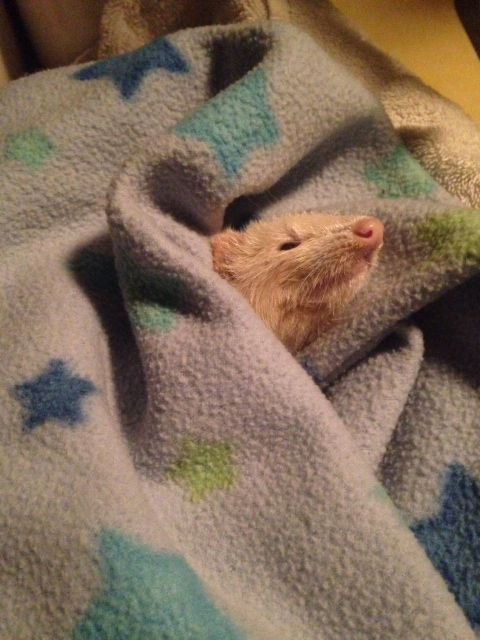 My ferrets die
Question
Mia
My ferret die lest nite she was ten
My ferrets die
Question
Mia
My ferret die lest nite she was ten
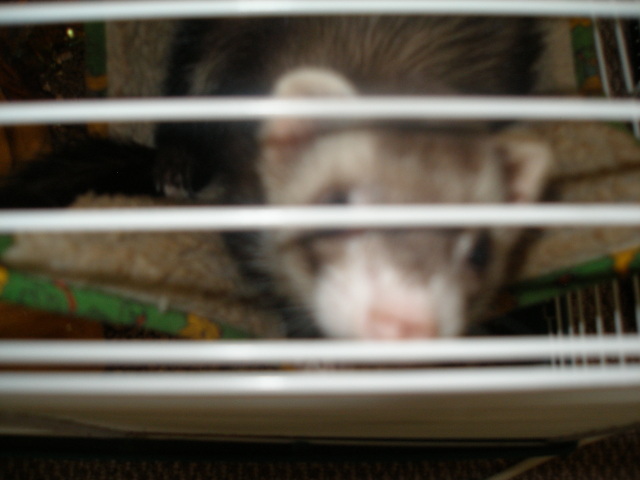 ferret losing weight seems listless
Question
mario
Hello my daughters ferret is a neutered
ferret losing weight seems listless
Question
mario
Hello my daughters ferret is a neutered
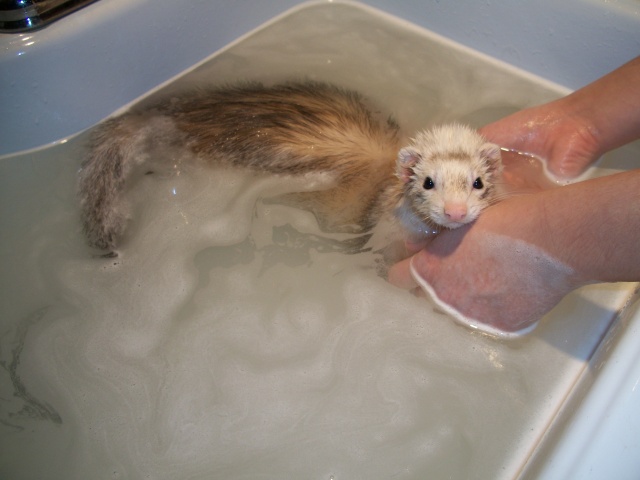 Just some basic help questions
Question
Benny!
Hi!
My ferret Benito (we just call him
Just some basic help questions
Question
Benny!
Hi!
My ferret Benito (we just call him
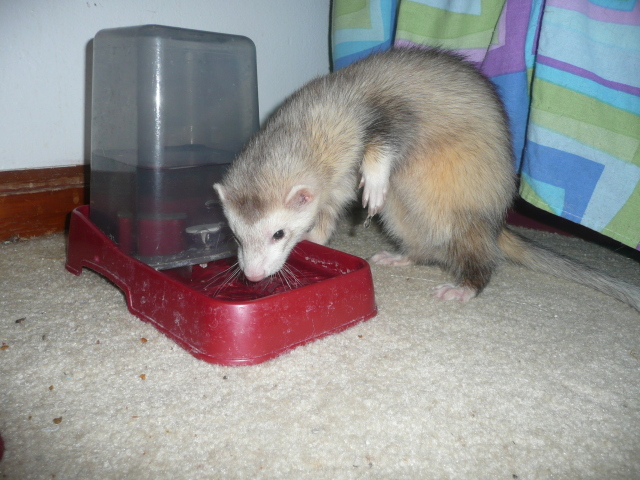 Ferret colors
Question
Mitch
Hello Cindy!
I have just adopted a new
Ferret colors
Question
Mitch
Hello Cindy!
I have just adopted a new